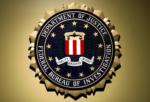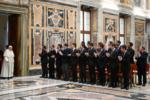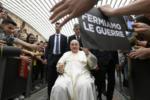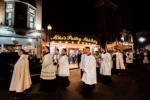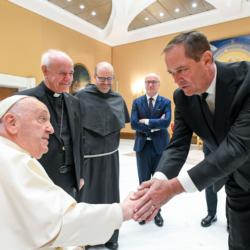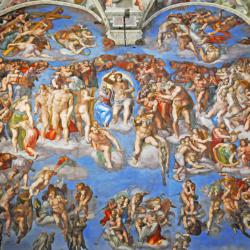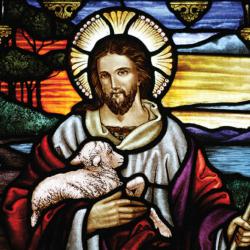Our false gods
While driving down the eastern seaboard during Christmas, we were stunned by the growth of Washington D.C. When one of us had an internship with Sen. Scoop Jackson many eons ago, D.C. was a small southern town. JFK famously called it a city with northern hospitality and southern efficiency. This trip we drove and drove and drove through the Maryland and NoVa areas which house the sprawl. Washington's sprawl reaches far into former farm and orchard lands.
Agencies and office complexes are necessary to oversee or lobby for or against regulations which further complicate modern living. Bureaucrats now exercise authority over many areas of our lives -- from light bulbs to unprotected sex, from trans-fats to the body restraints in cars. It is not just an aggressive and intrusive federal government. In Brookline, for example, veal was banned, prompting wags to comment, "They feel so sorry for baby calves, but not unborn human babies!"
In Rumania statues of former dictator Nicolae Ceausescu were denounced by Americans (and finally his own people). A strongman like Stalin or Saddam Hussein builds concrete monuments to himself, but we aren't like that. Yet, we have our own quite visible signs of congressional self promoting. We have the Sam Rayburn Office building, the Tip O'Neill (Big Dig) Tunnel and, more recently, the Charlie Rangel Center for Public Service at New York's City College. Is it just us or does it seem a little overbearing to have public buildings dedicated to politicians? Aren't these false gods? What happens when their reputations are tarnished by indiscretions or outright tax evasion?
Are these monuments there to make us feel better as we pay our taxes and tolls? We render enough unto Caesar. Some would wonder what's the beef if your government is providing for those in need. If healthcare is available universally why do we find fault? If education is provided, what's not to like?
There are, at least, three reasons for Catholics to be wary of governments' largess. First, we have let the governments assume what were once clearly Catholic functions. Not long ago, the care in hospitals and shelters was the work of the Church. All of us are called to perform corporal works of mercy. In the Middle Ages monks in monasteries kept the poor from devastating hunger and treated their ailments with their herbs. Just generations ago, in towns across the country, babes were born in hospitals with names such as "St Luke's" or "Mary Immaculate." The crucial end days once spent in Catholic hospitals and nursing homes are now converting into warehouses of the aged.
The great work of Catholic education has been reduced to a shell of itself, and while the causes of this tragic result are many, a half century of government policies have been a major contributor. Between ever-higher taxes and inflation-prompting fiscal decisions, Catholic schools languished. As Catholics moved out to the suburbs, parishes were established, but few followed the tradition of establishing schools. On the other hand, the hierarchy decided to keep the urban K-12 schools open and available to the largely non-Catholic community. Now a new set of government decisions, flying under the flag of school reform, is undercutting that altruistic decision.
For a decade now, charter schools have become the designated darling of government school reformers. With the enthusiastic support of both recent Washington administrations and the major foundations, charter schools have spread like wild fire. They have also laid waste to urban Catholic schools. Between 1900 and 2008, 1300 parochial schools, serving 300,000 children, have been closed. Why, one asks, would largely non-Catholic, inner city parents send their children to Catholic schools that they have to pay for when there is another alternative in free charter schools? Second, government run programs frequently do not represent, and often directly oppose, Catholic values. While many may agree with involvement of governments in education and welfare, it is unlikely that Catholic principles are often followed. Abortions, euthanasia, stem-cell research are among the issues we disagree about. Where we differ seems to be over when life begins and when it ends. Government seems bent on shaping our every moral thought.
Third, government efforts suppress personal charity. Belief in the incarnate Christ means we must take care of those who are less fortunate. In 2 Corinthians, St. Paul says, "So let each one give as he purposes in his heart, not grudgingly or of necessity; for God loves a cheerful giver." The Revised Standard Version has "not reluctantly or under compulsion." It is common to hear that the popular uprising against the growth of the welfare state, with its rising taxes and deficits, is based on a lack of caring toward those who are suffering during this current crisis. Some have even asserted that the backlash against the growth of government is nothing more than an attack on the poor.
We have all heard or perhaps felt the sentiment, "I gave at tax time, so let the government take care of them." There is room for honest differences over human motivation and responsibilities. Nevertheless, in a society that has loosened family ties and responsibilities, many people need some sort of financial security for troubled times and resent the government's "enforced charity."
The model of parish charity is a good place to correct this imbalance and for renewal of personal care and giving. The outreach to homeless shelters, Christmas gift boards for presents and holiday dinners for the poor are efficient ways of responding to social needs without bureaucracies. At least, it is a beginning.
Kevin and Marilyn Ryan edited "Why I Am Still a Catholic" [Riverhead Books, 1998] and live in Chestnut Hill, Mass.


